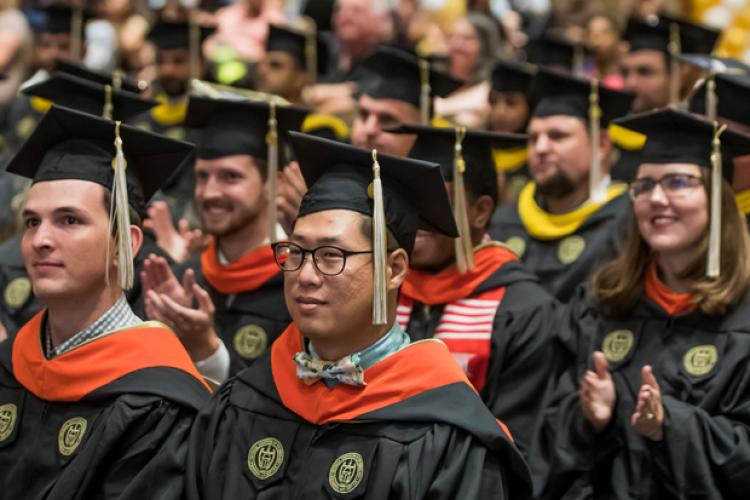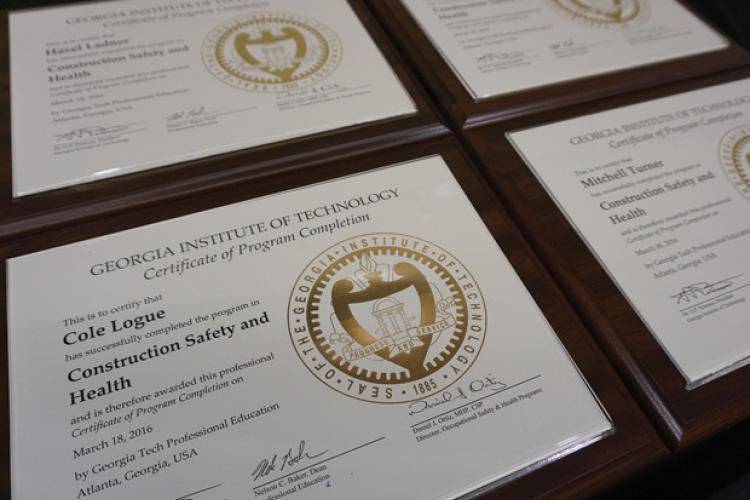
Online learning options provide a flexible and often cost-effective way to update skills, gain credentials, and even earn a degree on your own time, from anywhere in the world. From open online courses that are available to anyone, anywhere, at no cost, to online degree programs that are offered at a fraction of the cost of campus programs, Georgia Tech has partnered with leading providers of online learning platforms to deliver many of our world-class programs to learners around the globe.

Built on Georgia Tech's rigorous on-campus programs, our online degrees provide you the STEM and leadership capabilities to be competitive in your field.

Earn a customized credential to prepare yourself with the skills and expertise needed to get ahead, without the long-term commitment of a master's program.

Enjoy the challenge of a college class without leaving your high school. We partner with Georgia high schools to enroll students in advanced math courses that are not available in their high school programs.

Georgia Tech offers on-campus and online courses over the summer to current Georgia Tech students and to students from other universities.
I wanted to go back to school for some time, but I wanted to and needed to continue working. It was a great opportunity to earn a master's from Georgia Tech while still working full time.
Director of Software Architecture, Turner Broadcasting SystemWhether upgrading existing skills, developing new expertise, or earning in-demand credentials, online learning allows you to mix and match course content and credentials to distribute learning throughout your lifetime.

Earn micro-credentials and skill certifications that have been verified by industry experts to meet employers' needs.

Before enrolling in an online course, you should consider and measure your readiness for stepping into the online learning environment.

With so many online learning options out there, how do you know which one is right for you? Here's a list of the seven most important.
The degree you receive will be identical to one earned in an on-campus program. There will not be an "online" designation on diplomas awarded to students who completed their degree program online.
Are online degree courses taught at specific times, or can I learn at my own pace?The courses are typically taught asynchronously, which means learners access and study content anytime. However, there may be synchronous virtual office hours with faculty and teaching assistants, which students may need to attend in real time.
Can I take an exam at any time, or is there a block of hours for taking exams?Exam schedules vary from course to course. In general, exams are open for a period of time, during which students can take the exam.
What are the admission requirements for an online degree program?All graduate programs at Georgia Tech require an online application. Admission requirements vary by program. Visit your program's information page for details and stipulations.
Open Online Courses What is a MOOC?MOOC stands for "Massive Open Online Course."" These online courses make it possible for you to learn new skills and build your career credentials from anywhere in the world, at your own pace, and usually for free or at minimal cost.
Why take a MOOC?A MOOC is a great way to brush up on your skills, earn valuable career-boosting credentials, and pick up new knowledge. MOOC courses are appealing because you can take them no matter where you are in the world, often at your own pace and on your own schedule.
Are the courses free?Most courses are free, though there is a small fee if you opt to work towards a certificate of completion. Some courses count toward university credit—and some, like our online master’s program in computer science, offer a full degree. These credit-bearing courses do have fees associated with them.
What is the difference between distance learning and MOOCs?Distance learning typically takes videos of in-classroom lectures held on campus and makes them available for viewing online by those who are enrolled in the course. MOOCs are high-production videos that are recorded specifically for an online version of a course and their availability is not dependent on a campus course schedule.
Competency Assessments What is the University Learning Store?The University Learning Store is an online marketplace of skills-focused, competency-based credentials from some of the nation's top universities. Learning apps provide instruction in a skill area, and badge assessments verify a learner's competency in a skill area.
What kinds of credentials can I earn from the University Learning Store?The University Learning Store offers two kinds of credentials: verified competency, which is earned by completing a single badge assessment, and skills certifications, which is earned by completing a complete series of related badge assessments.
Can University Learning Store badges be recognized for college credit?No, not at the present time. However, specific sets of University Learning Store courses may be offered for credit in the future.
How much do University Learning Store credentials cost?The flexibility of the University Learning Store's learning resources and credentialing system means that you only pay for the parts you use. Learning apps and badge assessments are available for $25 each, paid separately upon enrollment.
Summer Online Undergraduate Program What is SOUP?The Summer Online Undergraduate Program is designed for admitted undergraduate Georgia Tech students who want to take summer courses but are unable to be on campus due to work or other commitments.
Who is eligible to take SOUP courses?Georgia Tech students who will be working at an internship, co-op, or unable to be on campus during the summer. Students who are participating in SOUP cannot also take classes on the Atlanta campus, any other Georgia Tech campus, or through the study abroad program.
How do I register for SOUP courses?The registration process is nearly identical to the other undergraduate courses. The only difference is that you must select the “QUP” section of the course; doing so tells Georgia Tech that you want to register for the online offering. Prior to registration you need to review the course requirments on the SOUP website to ensure you can meet them. Registration will open March 25 and students register according to their time ticket.
High School Math What are the academic requirements to be considered for admission to the High School Math program?You must have these credentials to be considered for the program: 3.5 GPA, 3.5 Math GPA, 600 SAT Math score or 27 ACT Math score, and a 4 AP Calculus BC Exam score.
Are High School Math program students required to attend classes on the Georgia Tech campus?No. While the classes offered are held on campus and taught to Georgia Tech students, as well, all High School Math program classes are delivered via live video or internet feed to the student's high school.
Online Learning Will I be able to talk to and ask questions of the course instructors?Generally, yes. Depending on the type of course or program you're enrolled in, your access to instructors may vary both in how you are able to contact them and how quickly they may respond. This largely depends on the number of students enrolled in a course, the course's structure, and the preferences of the individual instructor.
How can I interact with other students taking the same course?Most online courses and programs have message forums designed for interaction among students, teaching assistants, and instructors. These are primarily used for collaboration and mutual assistance among enrolled students.
Graduate Certificate Completion What is a graduate certificate at Georgia Tech?A graduate certificate offers increased flexibility for learners who aren't set on a master's degree and are looking for an "in-between" option. As an added benefit, the graduate certificate can either stand alone, be stacked as part of a progression toward a master's degree, or be pursued by learners already enrolled in master's programs, thus enabling them to graduate with both a master's and a graduate certificate in a certain area.
How long will the graduate certificate take to complete?Most students will complete one course per semester, so the certificate will take four semesters to complete. Courses will be offered in Georgia Tech’s fall and spring semesters, but elective courses may also be available in Georgia Tech’s summer semester.
Are these courses suitable for people who are working full time?Yes. The course delivery and structure will be similar to Georgia Tech’s existing online programs, which currently serve thousands of working professionals.
Are the courses easier than regular college-level classes?No. Each course is also part of Georgia Tech’s graduate curriculum and will require serious effort by students. But careful attention has been paid in developing the courses to ensure that they are accessible to students who have an undergraduate degree in chemical engineering or a related discipline.